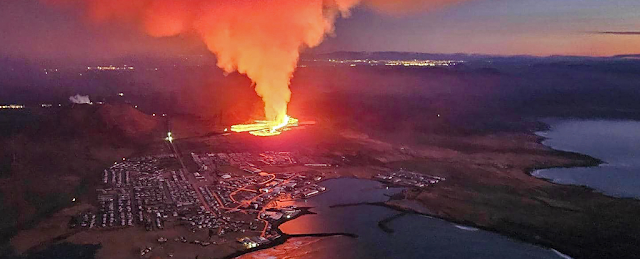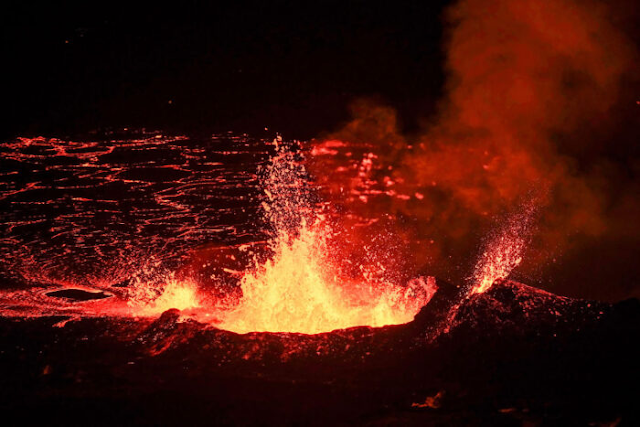Experts Confirm: Icelandic Faultline Has Awakened After 800 Years

Eruption on the outskirts of Grindavik, 14 January 2024. (Icelandic Department of Civil Protection and Emergency Management/AFP/Getty Images)
A volcanic eruption that has engulfed homes in an Icelandic fishing port confirms that a long-dormant faultline running under the country has woken up, threatening to belch out lava with little warning for years to come, an expert warned on Tuesday.
Glowing lava swallowed several homes on Sunday at the edge of the town of Grindavik, southwest of the capital Reykjavik.
The fishing town was mostly evacuated due to threat of an eruption last month and the most recent volcanic activity has since eased, authorities in the North Atlantic nation said on Monday.
The island straddles the Mid-Atlantic Ridge, a crack in the ocean floor separating the Eurasian and North American tectonic plates.
Sunday's eruption was the fifth in fewer than three years on the Reykjanes peninsula, which had not previously seen one in centuries.
"After eight centuries of a relative break and a complete cessation of surface activity, we have entered a new episode of plate separation which could last several years – possibly decades," volcanologist Patrick Allard from France's Institut de Physique du Globe de Paris told AFP.
Even before the first of the five eruptions on March 2021, scientists "saw the ground distorting, with magma rising from the depths and seeping into" an area three to 10 kilometers (two to six miles) below the surface, he said.
As that magma bubbled its way upwards through fissures in the Earth, eruptions started to occur.

19 December 2023 eruption. ( Kristinn Magnusson/AFP/Getty Images)
Ready to erupt
The two most recent eruptions – last month and on Sunday, both threatening Grindavik – were brief and preceded by very little seismic activity.
This shows that the "magma is very close to the surface, ready to erupt", Allard said.
The thinness of the Earth's crust near the faultline under Iceland will help prompt these magma "pressure releases," he said.
But the amount that will actually burst out of the Earth's surface is not expected to be enormous, he added.
The location of this fragile faultline is likely to continue to be a problem.
It poses a threat to the nearby Svartsengi geothermal plant, which provides electricity and water to the 30,000 residents of the Reykjanes peninsula – a tenth of Iceland's population.
The eruptions have also forced the closure of the Blue Lagoon, a popular tourist destination near Grindavik famed for its geothermal spas.
Allard said Grindavik was built on lava flows from 800 years ago, which "raises the question as to (the logic behind) the town's very existence".
And there will probably be little warning before the next eruption.
During the last two eruptions, there were only a "few hours of critical seismic activity" to warn that magma was quickly rising to the surface, he said.
There was also a risk of an underwater eruption, which could create an "explosive phenomenon, releasing more volcanic ash".
It was the huge amount of ash blasted into the atmosphere by the Eyjafjallajokull volcano in 2010 that caused global travel chaos, forcing the cancellation of some 100,000 flights and leaving more than 10 million travellers stranded.
However experts have said that such an extreme event is considered unlikely to happen on the Reykjanes peninsula.


No comments